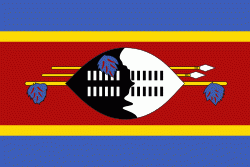Swazi lilangeni
L
The lilangeni (plural: emalangeni, ISO 4217 code: SZL) is the currency of Eswatini and is subdivided into 100 cents. It is issued by the Central Bank of Eswatini (in swazi Umntsholi Wemaswati) and is authorised by the king and his family. The South African rand is also accepted in Eswatini. Similar to the Lesotho loti, there are singular and plural abbreviations, namely L and E, so where one might have an amount L1, it would be E2, E3, or E4.It was introduced in 1974 at par with the South African rand through the Common Monetary Area, to which it remains tied at a one-to-one exchange rate.
The currency's name derives from emaLangeni, a term used to describe the ancestors of the Swazi people who migrated to Swaziland in the 18th–19th centuries.
Country
-
Swaziland
Eswatini (eSwatini ), officially the Kingdom of Eswatini and formerly named Swaziland (officially renamed in 2018), is a landlocked country in Southern Africa. It is bordered by Mozambique to its northeast and South Africa to its north, west, south, and southeast. At no more than 200 km north to south and 130 km east to west, Eswatini is one of the smallest countries in Africa; despite this, its climate and topography are diverse, ranging from a cool and mountainous highveld to a hot and dry lowveld.
The population is composed primarily of ethnic Swazis. The prevalent language is Swazi (siSwati in native form). The Swazis established their kingdom in the mid-18th century under the leadership of Ngwane III. The country and the Swazi take their names from Mswati II, the 19th-century king under whose rule the country was expanded and unified; its boundaries were drawn up in 1881 in the midst of the Scramble for Africa. After the Second Boer War, the kingdom, under the name of Swaziland, was a British high commission territory from 1903 until it regained its full independence on 6 September 1968. In April 2018, the official name was changed from Kingdom of Swaziland to Kingdom of Eswatini, mirroring the name commonly used in Swazi.
